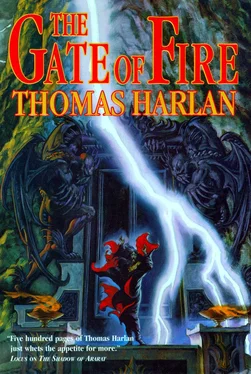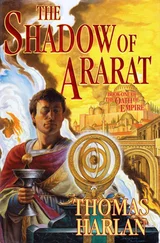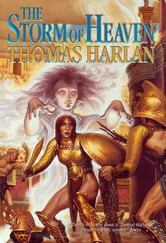Thomas Harlan - The Gate of fire
Здесь есть возможность читать онлайн «Thomas Harlan - The Gate of fire» весь текст электронной книги совершенно бесплатно (целиком полную версию без сокращений). В некоторых случаях можно слушать аудио, скачать через торрент в формате fb2 и присутствует краткое содержание. Жанр: Фэнтези, на английском языке. Описание произведения, (предисловие) а так же отзывы посетителей доступны на портале библиотеки ЛибКат.
- Название:The Gate of fire
- Автор:
- Жанр:
- Год:неизвестен
- ISBN:нет данных
- Рейтинг книги:4 / 5. Голосов: 1
-
Избранное:Добавить в избранное
- Отзывы:
-
Ваша оценка:
- 80
- 1
- 2
- 3
- 4
- 5
The Gate of fire: краткое содержание, описание и аннотация
Предлагаем к чтению аннотацию, описание, краткое содержание или предисловие (зависит от того, что написал сам автор книги «The Gate of fire»). Если вы не нашли необходимую информацию о книге — напишите в комментариях, мы постараемся отыскать её.
The Gate of fire — читать онлайн бесплатно полную книгу (весь текст) целиком
Ниже представлен текст книги, разбитый по страницам. Система сохранения места последней прочитанной страницы, позволяет с удобством читать онлайн бесплатно книгу «The Gate of fire», без необходимости каждый раз заново искать на чём Вы остановились. Поставьте закладку, и сможете в любой момент перейти на страницу, на которой закончили чтение.
Интервал:
Закладка:
"Let's go," whispered Odenathus, and they crept away through the neatly lined streets of the camp.
– |Even with the streets liberally supplied with oil lamps at the corners, it was dark in the district behind the Daphne Gate at the southern end of the city. Dwyrin stumbled on a missing paving stone, then skipped ahead. Odenathus was walking slowly, carefully surveying the porticoes of the town houses. This was an upscale merchant district-the streets were clear of both rubbish and drunken Roman officers-though it was so late that everyone must be sound asleep. The Palmyrene stopped, staring up at an elegant house with four graceful pillars arrayed across its front. He stepped up to the door, which was dark. The common lamp in the recessed doorway had gone out. Odenathus put his hand against the portal and cocked his head, listening.
Dwyrin stood in the street, looking at the other houses. Each showed little traces of light and habitation; plants on the upper balconies, the muted gleam of a candle or lantern in the entrance hallway. They seemed to breathe in the cold night air; even sleeping, they showed some trace of habitation. This house, the one that they had stopped before, seemed empty and cold, abandoned.
"Are you sure this is the place?"
Odenathus frowned in the darkness, his hand brushing against the carved pillars at the sides of the doorway.
"These are the traditional signs of the city; two palms placed at each entrance. I have been here once before, with my grandfather, and thought this was the street. But this house feels empty, which is very odd. I am sure that Zoe would have come here first, to find the consul. If she did, and everyone was out, I don't know where she would have gone…"
Dwyrin decided, pulling his cloak around him a little tighter. It was getting cold in the deep of night.
"Let's go find someone to ask where they went. Perhaps they moved to a bigger place."
"Wait," Odenathus said as the Hibernian turned to walk away. "We've had far too much wine this evening. We're not thinking clearly." He fumbled in the big leather carryall that he wore, like Dwyrin, strapped to his thigh. After a moment he pulled out a triangle of ceramic tile. "Ah," he breathed in satisfaction. "Do you still have yours?"
Dwyrin nodded. His was buried, too, down at the bottom of the carryall. But he found it by touch, just the way their old teacher Colonna had taught them. The piece of tile was notched on one side, chipped a little, but he held it out and Odenathus' piece slid into place like a long-lost mate.
"Do you remember the memory chant?"
Dwyrin bobbed his head, the feel of the smooth tile in his hand had already brought it back to him. He slowed his breathing and let his mind fall quiet. For a moment, as he approached the state of waiting and nothingness that his old teachers had called the Entrance of Hermes, he felt the muzziness of the wine lap around his consciousness, but then it was gone. Once he was centered, he let his sight unfold, focused around the two pieces of tile in their hands. The darkness fell away, replaced by glittering light where the broken pieces of tile met, then deep violet-and-blue patterns that rippled and flowed along the bricks of the street and the fronts of the houses. Odenathus stood out, a burning flame coiling and twisting where he stood. Dwyrin knew that his own hand, his own arm and body, were the same-rivers of fire tracing the beat of his heart and the surge of blood through his veins.
All this, as he must, he pushed away from his consciousness. An old voice, raspy with years of shouting commands over the din of battle, echoed in his memory: The second enemy of the sorcerer is too much sight, which drowns the mind in confusion and destroys your focus. The broken tile remained, though now joined by two ghostly cousins, one brighter and one darker. In all, the four made a square; a common flooring tile of fired clay, smooth on one side with a dull blue glaze.
"See," Odenathus whispered, "Eric's is lost, but our leader-of-five still carries hers. Lead us on, O thoughtful hound!"
Dwyrin drew his tile away, slowly, as did Odenathus. The two ghostly fragments hung in the air for a moment, then the fourth-that which had died with poor Eric in the dark cold of a river before the Persian city of Tauris-vanished, and the third: It spun in the air and then darted away. The Hibernian laughed, for they would have to run to catch it. Behind him, Odenathus cursed vilely. He hated running.
– |A dim flicker of dawn was showing in the east and it was cold on the docks, but the broad-shouldered man seemed impervious to the chill. A cutting spring wind came out of the mountains behind the port, but even with bare arms and shins the man remained on the pier. His guardsman loitered a dozen paces behind him. Wrapped in their own furs and armor, they doubtless thought the cold spring predawn to be refreshing, but then they were Scandians and Rus to a man and used to far worse than this. Beyond the end of the stone pier the massive shape of an Imperial galley pulled slowly away. Its great sail was still furled, and a dozen longboats crowded around it. Hawsers stretched from the backs of the longboats, and the rattle of their oars and the rhythmic chanting of the rowers carried easily over the open water. The quinquireme Juno Claudius would take almost two hours to make it out of the harbor to the open sea. Its decks were awash with light from sea lanterns, too, and the man on the dock could make out a small figure on the rear deck.
The man raised a hand in farewell, his stern face creased for a moment by a smile. He waved, and the small figure on the deck waved back, her pale white face showing for a moment. On the distant ship she moved and held up a warmly wrapped bundle so that he could look upon the face, tiny and indistinct, of his child again. His hand dropped, and he tugged the hood of the cloak over his head and its blond curls. He turned, hearing the rattle of boots on the dock behind him.
"Royal brother! The Empress is safely away?"
Heraclius, Emperor of the Eastern Roman Empire, Avtokrator and Augustus of the Greeks and Romans, turned to face his younger brother. The open, guileless smile was gone, and now his face was stern, the face of the ruler of half the known world. He raised his hand and clasped his younger brother's fist in his own.
"Greetings, Prince of Persia. Yes, Martina and my son are safely away. They will reach Constantinople and the luxurious refuge of the Imperial Court within a week. While we, dear brother, will still be here sorting out men and cargo and loot and assignment…"
Theodore smiled broadly at the sound of the loot, his teeth gleaming white in the thicket of his red beard. Where Heraclius was tall and broad, his younger brother was thick and stout, but each showed an echo of their father's pugnacious nose and blunt personality. The Prince was clad, as was his wont, in cavalryman's leather and half-armor, with a long blade slung over his back and riding boots. While the Emperor's cloak was a thick red woolen with purple thread and ermine edging around the hood, the Prince affected a shorter, Oriental-style cloak with a fur lining and a silk outer layer. Heraclius had considered mentioning to his sib that though Theodore was Prince of Persia in name, he need not ape its fashion-but he had held his tongue.
"Have you eaten yet? My servants are already up and making breakfast…"
Heraclius shook his head, no, and began walking along the pier. His brother fell in beside him, as he had done for twenty years, and the guardsmen shook themselves out into a loose cordon around the two. Some of the hulking Northerners went ahead, while others trailed behind. Their cold blue eyes watched everything, even the dark water, and their hands rested easily on the hilts of their swords.
Читать дальшеИнтервал:
Закладка:
Похожие книги на «The Gate of fire»
Представляем Вашему вниманию похожие книги на «The Gate of fire» списком для выбора. Мы отобрали схожую по названию и смыслу литературу в надежде предоставить читателям больше вариантов отыскать новые, интересные, ещё непрочитанные произведения.
Обсуждение, отзывы о книге «The Gate of fire» и просто собственные мнения читателей. Оставьте ваши комментарии, напишите, что Вы думаете о произведении, его смысле или главных героях. Укажите что конкретно понравилось, а что нет, и почему Вы так считаете.











